Discover and read the best of Twitter Threads about #datafeminism
Most recents (12)
I’ve been wanting to say this out loud for a while…
“ᴅᴀᴛᴀ ʟɪᴛᴇʀᴀᴄʏ” just doesn’t sit right with me.
I think I'd rather identify as data curious | critical | confident than data literate. Want to know why?
🧵a thread 🧵 1/8
“ᴅᴀᴛᴀ ʟɪᴛᴇʀᴀᴄʏ” just doesn’t sit right with me.
I think I'd rather identify as data curious | critical | confident than data literate. Want to know why?
🧵a thread 🧵 1/8
Literate can mean:
1. having knowledge or competency in a specified area.
2. being able to read or write.
So riddle me this: do you need to be literate to be literate? 2/8
1. having knowledge or competency in a specified area.
2. being able to read or write.
So riddle me this: do you need to be literate to be literate? 2/8
In the spirit of #datafeminism and challenging power, literacy is exclusive. It places reading and writing above orality. The OECD defines six levels of literacy, but ultimately it’s a binary of either being literate (have) or not (have not). 3/8
🧵It's #InternationalWomensDay and given the uptick in media coverage of #digitalsleuths: Let’s talk about representation in open source research!
When we use open sources to report on war, whose voices, experiences are we amplifying?
#Russia #Ukraine #OSINT #OSINTUkraine
When we use open sources to report on war, whose voices, experiences are we amplifying?
#Russia #Ukraine #OSINT #OSINTUkraine
Like most groups, @amnesty is publishing analysis partly based on open sources from #twitter as well as Telegram, Facebook, VKontakte, etc. For us the focus has is on possible war crimes.
E.g. this thread by the Crisis Evidence Lab ↓
E.g. this thread by the Crisis Evidence Lab ↓
Social media is a critical source (great!) but it privileges certain types of violence. Violence that is less spectacular e.g. dehydration, starvation, lack of access to medical supplies and electricity, or racism.
HT @bobtrafford 🙏🏻
hrw.org/news/2022/03/0…
HT @bobtrafford 🙏🏻
hrw.org/news/2022/03/0…
Small quant exercise I did in my first year seminar as an intro on a discussion on positionality in science research: 1/1
I asked "how much does it cost to get from here [Bates College] to New York City?" And I gave them 60 seconds to come up with a number. I said they could even use their phones, computers, estimate, etc. 2/2
When time was up, I said "Compare answers with other your groups. Are they different? How and why?" After a small chat, I said "Okay, let's report out - I don't care about the cost, what I want to know is what assumptions did you make?" 3/3
The #DataFeminism book also made me look inward and examine my own biases, which I am exceedingly grateful for.
Namely, it forced me to reckon with some of my fundamental operating assumptions as a statistician & data scientist.
Examples threaded below...
Namely, it forced me to reckon with some of my fundamental operating assumptions as a statistician & data scientist.
Examples threaded below...
In chapter 3, the authors discuss the role of emotion in data visualization, specifically calling out giants in the field like Edward Tufte and Alberto Cairo (no snitch tagging, please) for what is presented as an anti-emotion stance.
On Tufte: "Any ink devoted to something other than the data themselves ... is a suspect and intruder to the graphic. Visual minimalism, according to this logic, appeals to reason first. ... Decorative elements ... are associated with messy feelings ... and emotional persuasion."
I learned a lot from #DataFeminism, but one of my favorite take-aways is the term "Big D!ck Data." From Ch. 6: data-feminism.mitpress.mit.edu/pub/czq9dfs5/r…
BDD "is a formal, academic term ... to denote big data projects that are characterized by patriarchal, cis-masculinist, totalizing fantasies of world domination as enacted through data capture and analysis."
"Big D!ck Data projects ignore context, fetishize size, and inflate their technical and scientific capabilities."
There are 7 core principles of #DataFeminism:
1. Examine Power
2. Challenge Power
3. Elevate emotion and embodiment
4. Rethink binaries and hierarchies
5. Embrace Pluralism
6. Consider Context
7. Make labor visible
1. Examine Power
2. Challenge Power
3. Elevate emotion and embodiment
4. Rethink binaries and hierarchies
5. Embrace Pluralism
6. Consider Context
7. Make labor visible
Principle 1: Examine Power
"#DataFeminism begins by analyzing how power operates in the world."
data-feminism.mitpress.mit.edu/pub/vi8obxh7/r…
"#DataFeminism begins by analyzing how power operates in the world."
data-feminism.mitpress.mit.edu/pub/vi8obxh7/r…
Principle 2: Challenge Power
"#DataFeminism commits to challenging unequal power structures and working toward justice."
data-feminism.mitpress.mit.edu/pub/ei7cogfn/r…
"#DataFeminism commits to challenging unequal power structures and working toward justice."
data-feminism.mitpress.mit.edu/pub/ei7cogfn/r…
Today, on #InternationalWomensDay I'd like to celebrate 10 amazing academics who've changed the fields of #STS #STEM and social sciences, and made significant impact on my own research. Follow them, come work with them, read and cite their work! #WomensDay #AcademicTwitter
Alondra Nelson @alondra is the first #STS scholar to have become a science advisor to the President of the United States. Prof. Nelson is recognized for her pioneering studies of #genetics #race and #technology and for years she's worked to support social sciences in the US.
Shoshana Zuboff @shoshanazuboff. Everyone's read The Age of Surveillance Capitalism. It is in Prof. Zuboff's terms that we all discuss #BigTech and the privacy crisis that challenges our democratic institutions. #SurveillanceCapitalism
We asked our community - "If you could recommend just 1 economics/policy book authored by or about women which would it be and why?"
We've loved hearing back and are compiling all the responses below! 📚👩💻🚺
THREAD (1/n)
#EconTwitter #AcademicTwitter
We've loved hearing back and are compiling all the responses below! 📚👩💻🚺
THREAD (1/n)
#EconTwitter #AcademicTwitter
#DataFeminism by @kanarinka and @LaureiroFer is a must-read which examines how intersectional feminism plays out in a data-driven world 📊
'A Doctors Experiment in Bihar' by @taru_jindal on leaving her lucrative career options to serve rural pregnant women. A great read to learn about the Indian health sector 🤰
1/ I am reading the UK National Data Strategy. Some great stuff, some concerning stuff, but overall, I wish other countries can do this too in the open. Here is a loose thread of my thoughts while I am reading it. Nice job @la_gaia and team! #NationalDataStrategy
2/ There is something very colonial about the phrasing - "Championing the international flow of data." Data Colonialism is real and the UK doesn't need to champion international data flow, it needs to be collaborative. #NationalDataStrategy
3/ I find it strange that this strategy defines data as information. It can be a single piece of information, but the definition there is confusing data types, information and knowledge. Should be a bit tighter, because this will help others as well later. #NationalDataStrategy
How did the #pandemic unfold for those who exist at the margins of the society? Watch this space for conversations @so_radhikal has had while researching what pandemic surveillance looks like for marginalised communities in India, as designed by Harmeet Rahal. #bodiesanddata
@bodyanddata @nipfp_org_in @INBreakthrough @ThinkCREA @tandem_research @Labia_LBT @NazariyaQFRG @IDFCinstitute @swarraj @GatherSisters @AWID @tarshingo @LoomNepal @unwomenindia @anjakovacs @medianama @thecaravanindia @cis_india @DataGovNetwork @FeminismInIndia @EqualityLabs
In this first vignette, @pointofview's Director Bishakha Datta highlights how technology has aided the gendered gaze of surveillance through this lockdown for various marginalised groups. #bodiesanddata #datagovernance 



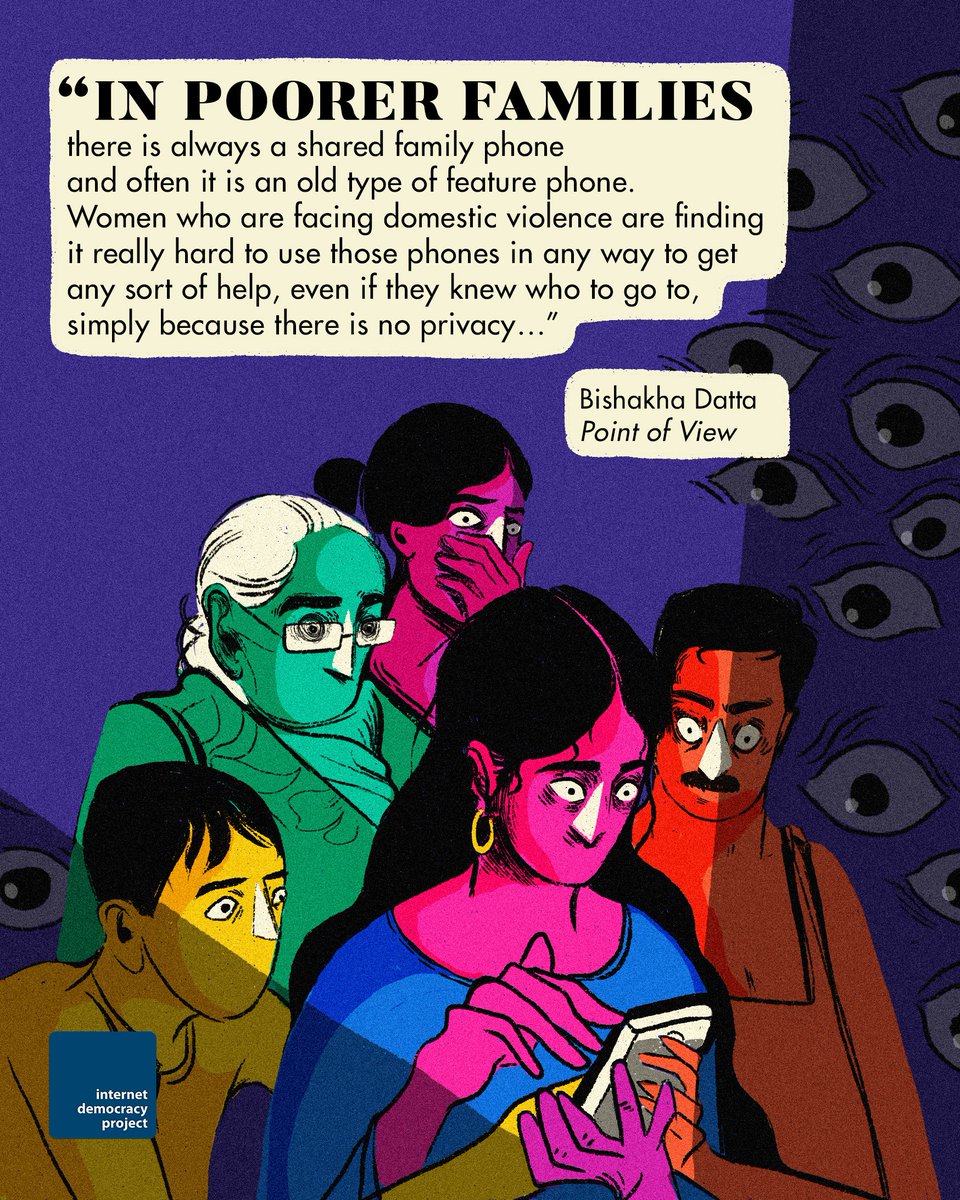
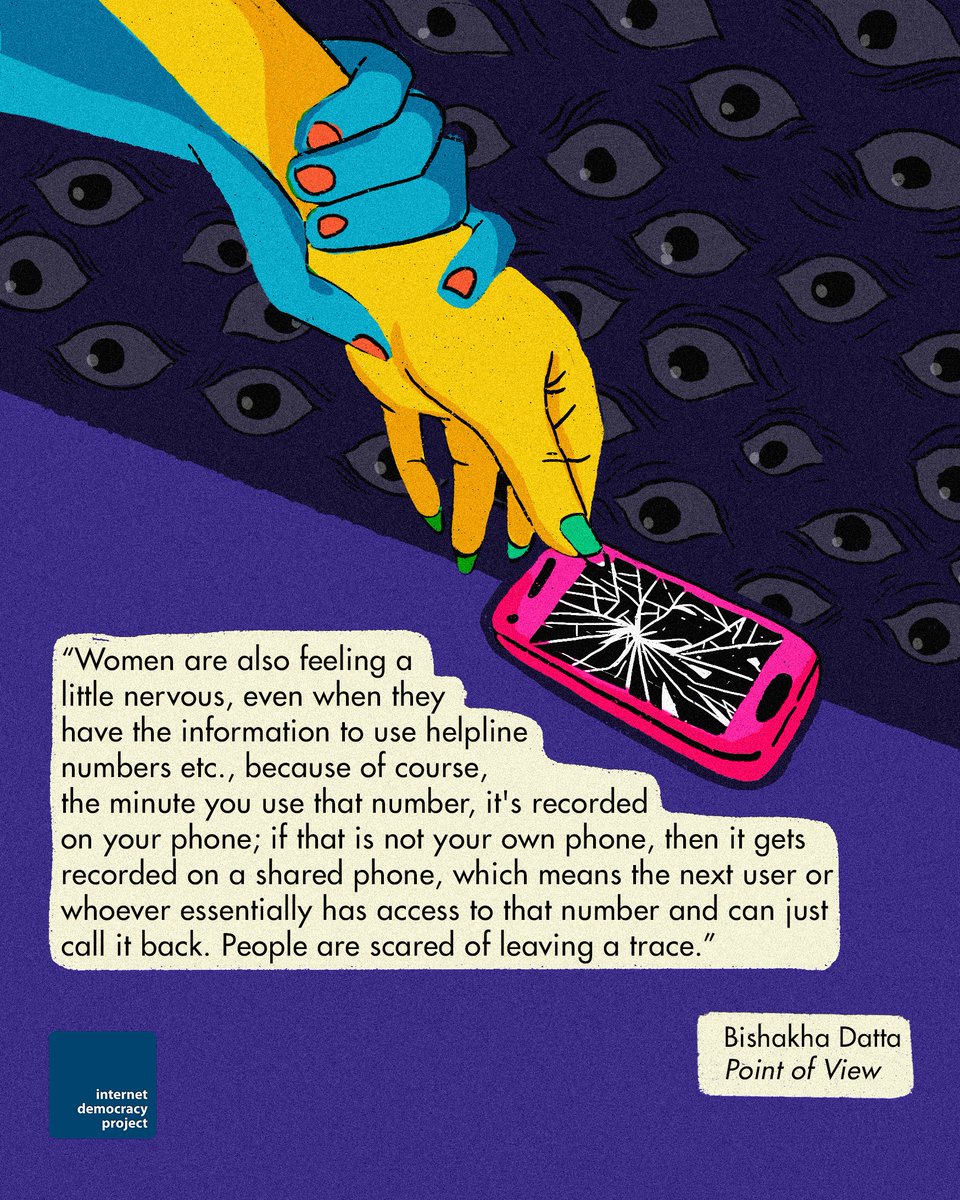
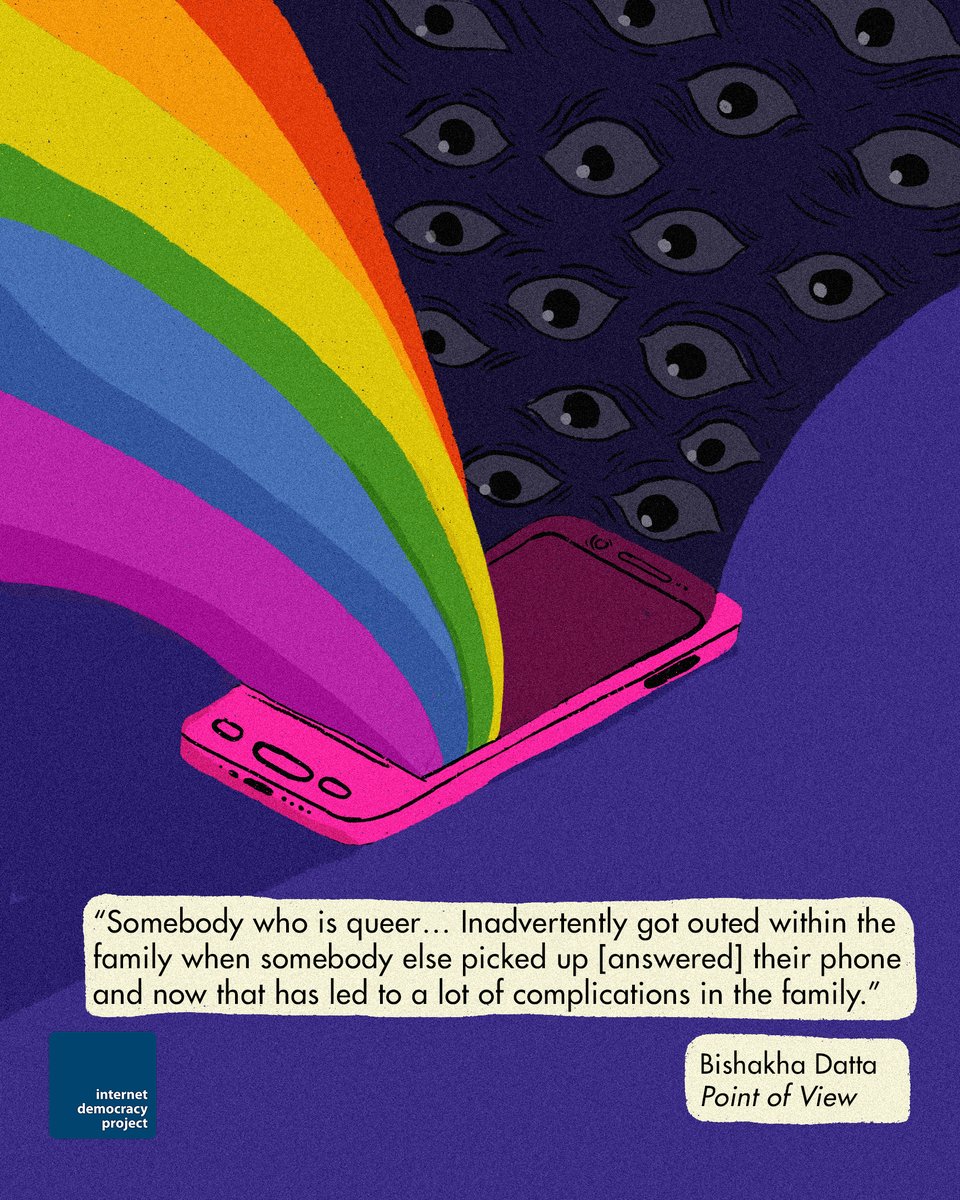
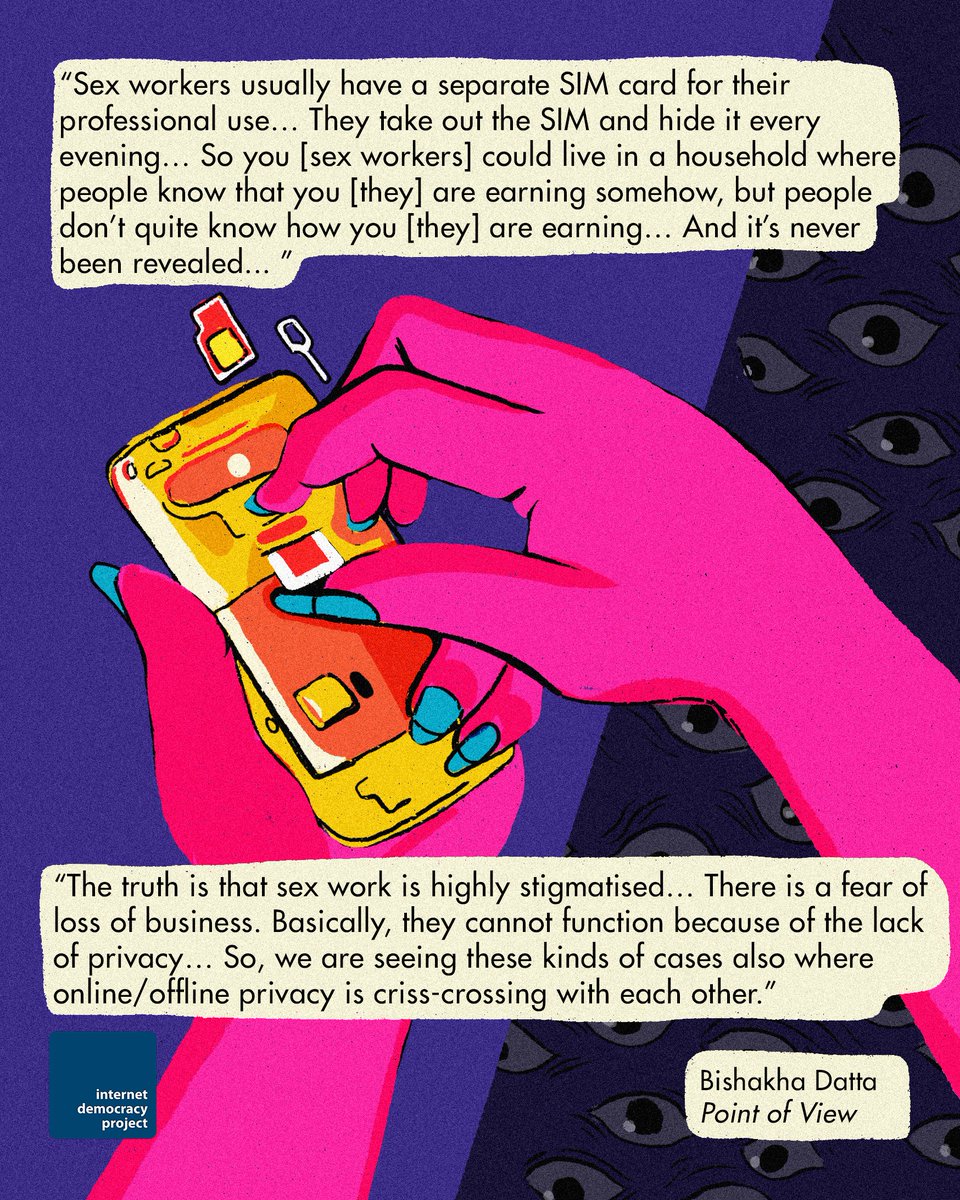
@laurenfklein: In today's world, data is power. Data science needs intersectional feminism, which provides models to examine power, to challenge the matrix of domination that continues to oppress certain groups and not others #DataFeminism at @datasociety
mitpress.mit.edu/books/data-fem…
mitpress.mit.edu/books/data-fem…
@kanarinka: For example, María Salguero's #NiUnaMenos project amassed the largest public database for femicides in Mexico after the Mexican government refused to track these deaths. This is a form of feminist counter data.
#DataFeminism at @datasociety
#DataFeminism at @datasociety
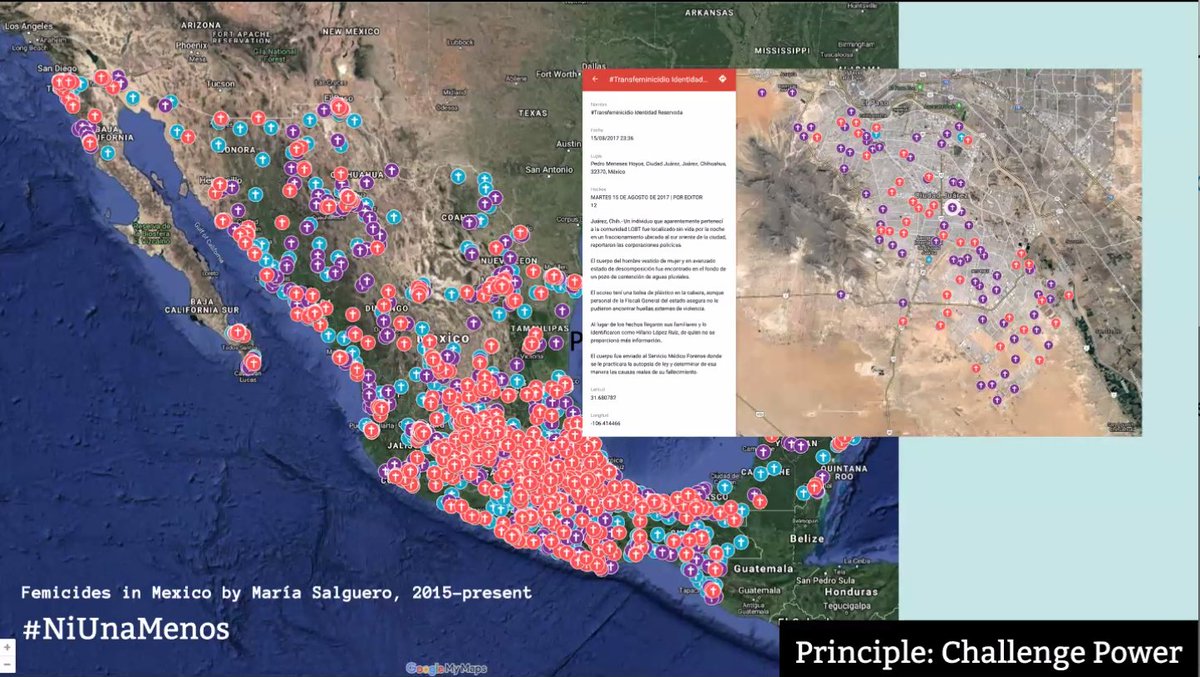
7 Principles of #DataFeminism:
1) Examine power
2) Challenge power
3) Rethink binaries and hierarchies
4) Elevate emotion and embodiment
5) Embrace pluralism
6) Consider context
7) Make labor visible
#databites at @datasociety
1) Examine power
2) Challenge power
3) Rethink binaries and hierarchies
4) Elevate emotion and embodiment
5) Embrace pluralism
6) Consider context
7) Make labor visible
#databites at @datasociety
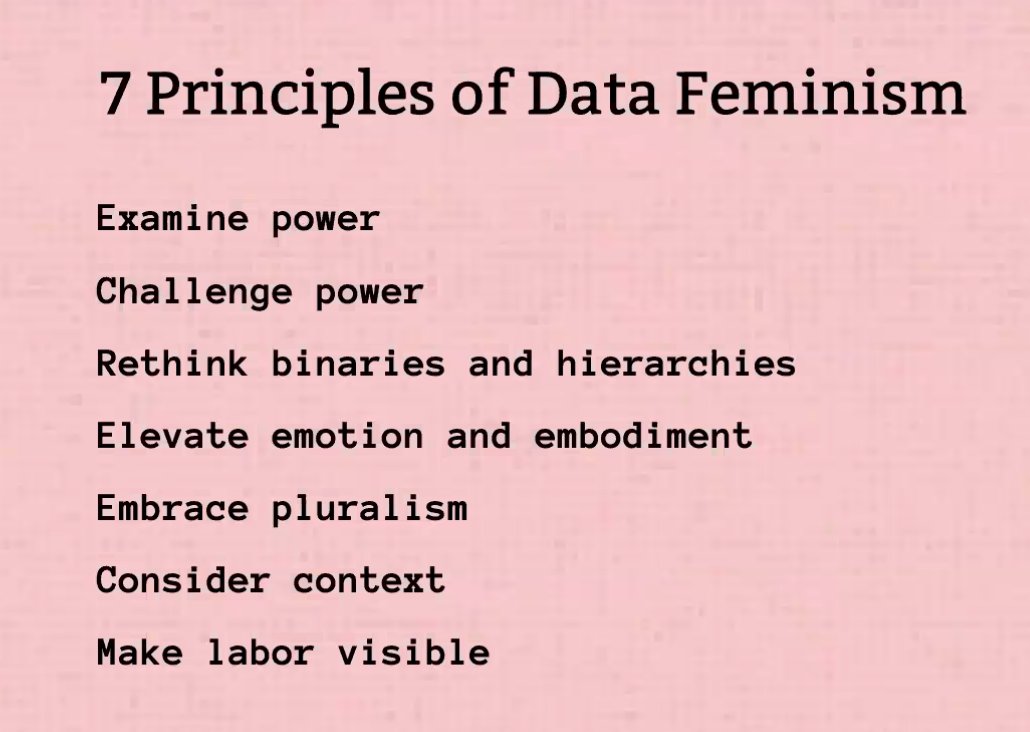
Hello! I'm @busydot and I am part of @povmumbai, a feminist non-profit in #Mumbai. We work at the intersection of gender sexuality and digital technology, and today I'm going to tweet about data through a feminist lens.
@busydot @povmumbai So much to say, so little time. :) I'm going to dive deep into looking at how women's bodies have become part and parcel of digital data collection and processing. Think menstrual apps, period trackers, fertility apps, pregnancy apps.
@busydot @povmumbai In her @deepdives essay, Data Bleeding Everywhere, @nuqsh explores period trackers from the perspectives of women and girls using them. It's a fascinating exploration and here's what she finds. deepdives.in/data-bleeding-…
